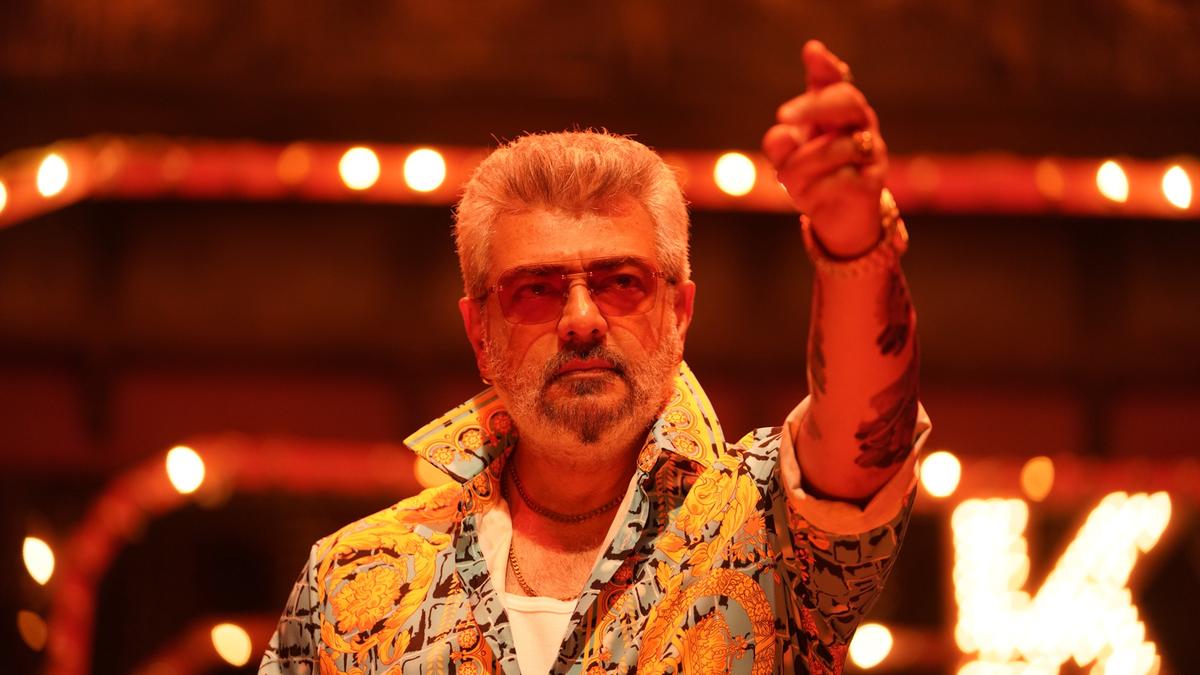
‘Good Bad Ugly’ movie review: Ajith Kumar and Adhik’s pop-culture goldmine delivers despite hollowness
The Hindu
‘Good Bad Ugly’ movie review: Ajith Kumar and Adhik’s pop-culture goldmine delivers despite hollowness
Who knew that a character sending a specific someone’s photo on a WhatsApp group would make for one of the ‘massiest’ sequences we have seen in recent times? Director Adhik Ravichandran, who, over the last ten years, has gotten us used to his use of bright colours, dutch-angle shots and quirky humour, takes it up a notch with his fifth film Good Bad Ugly (GBU), and with his idol Ajith Kumar headlining it, the young filmmaker pulls off what netizens would term as a “fanboy sambavam.”
In GBU, AK (Ajith Kumar) is a retired gangster who has spent his due share of time behind bars and wants to lead a happy life with his wife, Ramya (Trisha), and son, Vihaan (Karthikeya Dev). But trouble comes knocking his way when his son is wrongly arrested and put behind bars. For the sake of the very son for whom he put down arms, AK now has to enter a world he vowed never to return to.
Mark Antony will remain unchallenged as Adhik’s most complex film yet as he goes back to his roots to conjure a wafer-thin plot for GBU. So what does he fill up the film with? There’s Ajith to save the day, and when he isn’t walking or talking, we have a slew of characters that mouth references to the actor’s yesteryear films. These references are stuffed to the brim in Good Bad Ugly. If nothing else, it makes for a great drinking game: if you took a shot each time an Ajith film reference is made, you would be out cold before it’s intermission.
To run with the Gen-Zoomers, I would call GBU a ‘vibe.’ You would either find it to be your cup of soothing tea or an ostentatiously made smoothie of mindless reel-worthy sequences stitched together. The film certainly takes time to get going, and if you are like me, it does grow on you and might even leave you wondering if it actually gets better when it picks pace or whether you have gotten used to this world that Adhik has elaborately crafted. No wonder he starts the film with a card that goes ‘Welcome to the world of GBU’ and he is not kidding with it. In this world, logic does not take the back seat; it’s tied to the back of the car and dragged for miles only to realise that the rope snapped a long time ago. If you are familiar with Adhik’s work, logic and emotionality would be the last things you would expect to find here.
And if you are not familiar with Ajith’s body of work, GBU isn’t for you. The references to his previous films start right from the very first scene, which includes a voiceover by Mahanadhi Shankar, the man whose dialogue in Dheena gave Ajith the nickname ‘Thala.’ Of course, as expected, there are references to other hits such as Billa, Varalaru, Mankatha, Villain, Amarkalam and Vaalee. What comes as a pleasant surprise are the references to relatively lesser-known titles like Red and Kireedam. In fact, it’s not just Ajith who gets this treatment. Simran, who appears in a cameo as Priya from Vaalee, talks to AK about his ‘Sona’ (IFKYK). Trisha supples a Lesa Lesa callback, Prabhu repeats a line he once mouthed in Billa, Prasanna gets a Sneha reference... the list keeps going. There’s even a Vijay reference!
Just as you wonder if Adhik is relying solely on these callbacks, he brings the best of Tamil pop culture to the screen — right from the trending meme jokes such as the ‘Irunga bhai’ line and the ‘card mela irrukura 16 number’ joke to remixing the iconic ‘Puli Puli’ song by Darkkey Nagaraja (apart from crooning the song, the Samba Rock icon makes a cameo too). Speaking of yesteryear songs, if Adhik hadn’t warned you with the ‘Panju Mittai’ remix in Mark Antony, we get everything from a remix of ‘Oththa Roova’ from Nattupura Pattu, a sampling of ‘En Jodi’ from Vikram and usage of ‘Sakalakala Vallavan’ and ‘Thottu Thottu Pesum’ tracks.
Arguably, the biggest trick Adhik pulls off is how he stacks easter eggs and references to hide the utter lack of an intriguing plot. Nevertheless, cracks appear multiple times in the facade that he has carefully sculpted. The secondary characters rarely have anything to do besides praising AK, and with even Arjun Das’s The Prestige-inspired villain failing to intimidate, GBU suffers without a fascinating conflict. At its core, GBU is the story of a gangster husband and a government official wife who use their brawn and brain to save their son from being wrongfully punished by the law. However, the film never builds on this. Instead, it becomes a showreel by a fanboy who has gotten to work with his favourite star — which, surprisingly, works in places. What comes as a pleasant shocker are the references to international titles, which, we hope, do not land the team in troubled waters over IP issues.

 Run 3 Space | Play Space Running Game
Run 3 Space | Play Space Running Game Traffic Jam 3D | Online Racing Game
Traffic Jam 3D | Online Racing Game Duck Hunt | Play Old Classic Game
Duck Hunt | Play Old Classic Game











